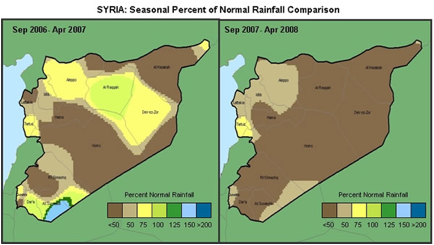Syria is certainly a complicated region, one where many factors have come together to produce the first-class genocidal mess now in progress. But one of those factors illustrated above might surprise you, and if it’s accurate, it should even worry you:
The Atlantic — Syria has been convulsed by civil war since climate change came to Syria with a vengeance. Drought devastated the country from 2006 to 2011. Rainfall in most of the country fell below eight inches (20 cm) a year, the absolute minimum needed to sustain un-irrigated farming. Desperate for water, farmers began to tap aquifers with tens of thousands of new well. But, as they did, the water table quickly dropped to a level below which their pumps could lift it.
In some areas, all agriculture ceased. In others crop failures reached 75%. …Hundreds of thousands of Syria’s farmers gave up, abandoned their farms and fled to the cities and towns in search of almost non-existent jobs and severely short food supplies.
The domestic Syrian refugees immediately found that they had to compete not only with one another for scarce food, water and jobs, but also with the already existing foreign refugee population. Syria already was a refuge for quarter of a million Palestinians and about a hundred thousand people who had fled the war and occupation of Iraq. Formerly prosperous farmers were lucky to get jobs as hawkers or street sweepers. And in the desperation of the times, hostilities erupted among groups that were competing just to survive.
This is a foretaste of what’s coming soon to other less-than-stable parts of the world. But it’s not limited to those people. Australia is already reeling from the consequences of prolonged heat and drought. It’s just a matter of time before critical portions of the US and EU agricultural bases follow suit.
On the question before Congress, symbolic strikes against the Syrian government for the use of checmical weapons against unarmed civilians, I’m conflicted. On the one had it would be nice to see Assad pay, on the other it’s far from clear if a limited strike would do any good at all, outside of killing a few or many low level Syrians. The bottom line for anyone caught up in the cross fire, death is death. Doesn’t matter how or why.
Dropping GPS bombs that blow people to bloody bits is somehow “OK,” but dropping chemical weapons that kill the same people is against the “law”. I can’t help but notice this means death dealt out by expensive traditional armies and air forces in established nations, like the US, are allowed, whereas weapons that give less well equipped combatants similar ability to deal out death and misery are deemed to be against vague, shadowy rules; rules that are coincidentally created and soon-to-be enforced by those with the largest, most capable conventional forces.


This is really interesting. I had not heard of this as a source of the conflict in Syria. I had previously heard that the genocide in Sudan was a result of climate change. Truly frightening the seeds we are sowing with our abuse of fossil fuels.
The drought picture and the farmers desperately drilling more and deeper wells reminds me of what we’re seeing here in South Texas.
Scary stuff.
^ Yes to both the above comments. Interesting scary and something, a whole other factor and dimension to this dreadful conflcit that, we (well *I* anyhow) haven’t heard about before. Thanks for this DarkSyde.
On the question of whether or not to militarily strike Syria and Assad I think this blog post by Jim Wright
http://www.stonekettle.com/2013/08/red-lines.html
on the ‘Stonekettle Station’ blog sums it up best. I don’t know what the right thing to do is – its an absolute awful mess with no really good options and horrid consequences whatever anyone does or doesn’t do. I think Obama is wise to seek congressional approval and we’d be wise to learn a lot more about what the actual facts here are and think very hard about what we want to see happen or least want to see happen first before acting or deliberately not acting.